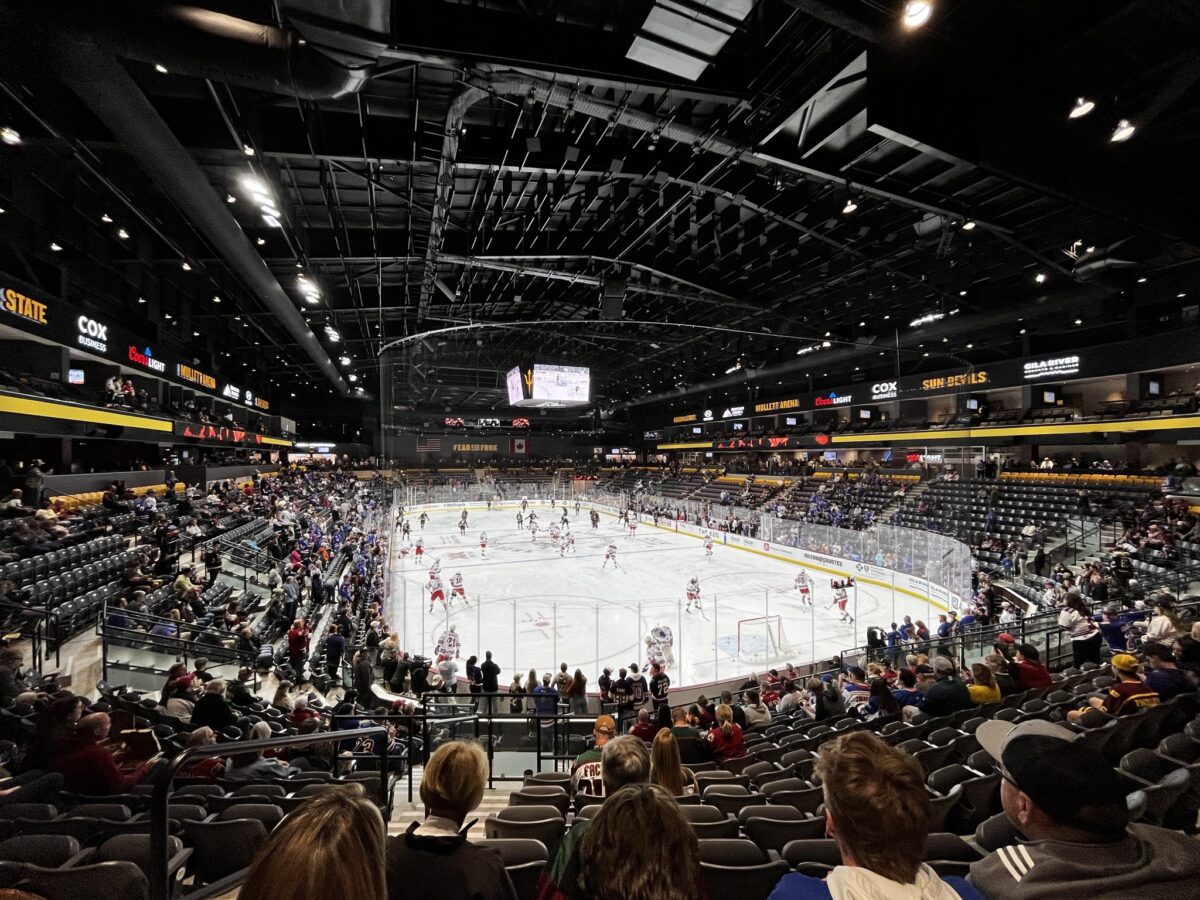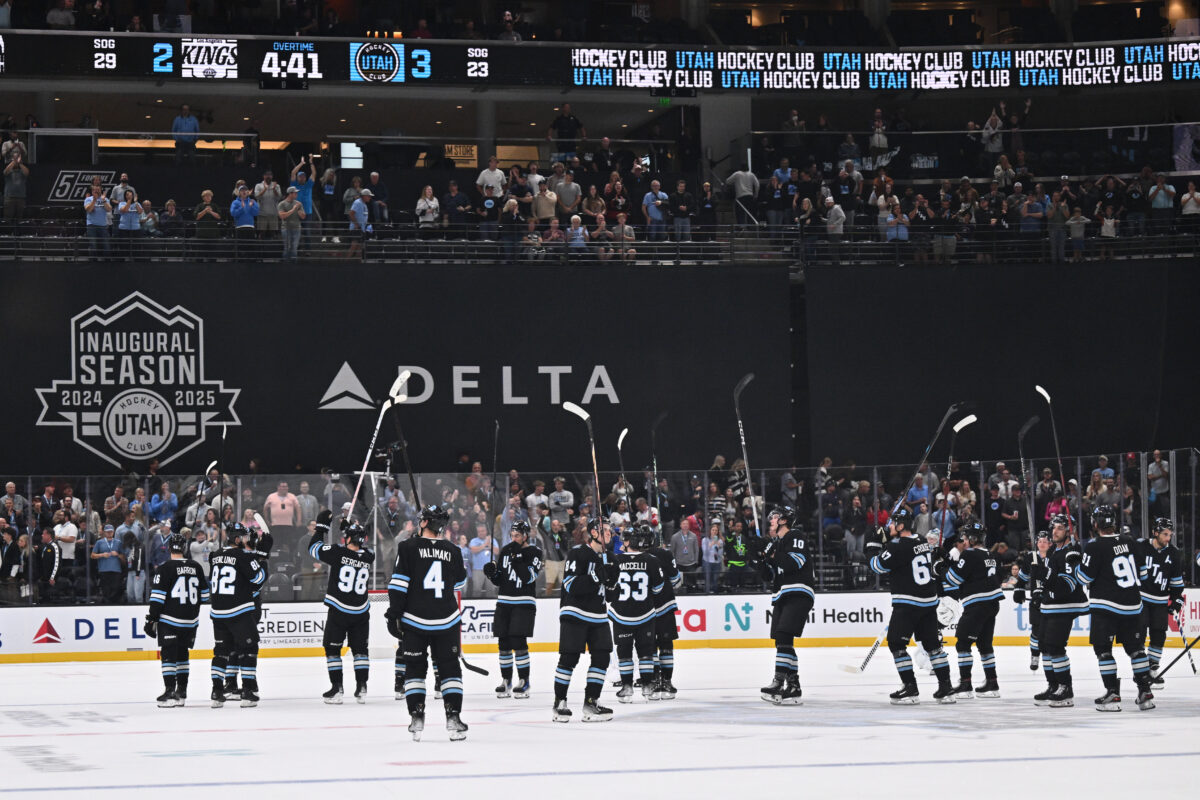Hockey in the desert. What once was a mystical thought that a sport could survive in an environment where temperatures reach upwards of 120 degrees became a reality in the summer of 1996 when the Winnipeg Jets relocated to the Valley of the Sun, changing the NHL landscape forever.
At the time, the Phoenix Suns and Arizona Cardinals were already established, along with the Phoenix Mercury of the Women’s National Basketball Association (WNBA) in 1997 and the Arizona Diamondbacks two years later in 1998. Sports were on the rise in the desert southwest, and rather than just being a burning hot city with little to do, it became a hub for professional sports, which is another reason why the Arizona Coyotes were born in 1996.
Related: Arizona Coyotes Officially Relocating to Salt Lake City
Fast forward nearly three decades, and the terrain has undoubtedly changed with the relocation of the Coyotes to Salt Lake City, Utah. With a myriad of failed ownership groups, rebuilds, and the inability to find a permanent arena, it was a meltdown to such a promising opportunity.
That being said, the Utah Hockey Club is off to a fast start, and most eyes are drawn to the rising stars in Logan Cooley and Dylan Guenther, and rightfully so. However, the state of hockey in Arizona has been neglected despite having two teams still in the desert: the Arizona State Sun Devils and the Tucson Roadrunners.
That’s not to say that hockey in the desert is dead; it’s not, but it’s not to say the departure of the Coyotes has helped anyone; it hasn’t. So, what is the state of hockey in Arizona? What does the future hold? While some questions won’t be answered for the foreseeable future, it’s still something to look at.
The Aftermath of the Departure of the Arizona Coyotes
The four major sports leagues have seen relocation; sometimes, it’s inevitable. Take a look at the City of Oakland, which lost both the Raiders and now, after the conclusion of the 2024-25 season, the Oakland A’s. When problems arise with the stadium, attendance, or what have you, it’s part of the business, despite never feeling good for the fans or business operations.
Now, for the state of Arizona and the fans and community built throughout, the last few months have been a rollercoaster of events since the team’s departure. Some fans have elected to follow the team, while others are on the other side of the spectrum, choosing another NHL team to follow or waiting for a team to return to the Valley, whenever that day may be.

“Eventually, you go through some of the joys when you remember some of the great times you had. There’s some incredible moments that the Coyotes have provided for me and my family,” Shane Doan said. “The relationship that my family has with the Valley is so special and often underserved when you think about how much this community has given me.”
It will never be the same in terms of hockey in the desert, but that isn’t to say there’s no hockey left, as the Arizona State Sun Devils and Tucson Roadrunners stand tall in the light of the Coyotes’ departure.
Arizona Sun Devils & Tucson Roadrunners Lone Wolfs in the Desert
What does loyalty look like? How can you define it in the sport of hockey? Look no further than Sun Devils’ head coach Greg Powers, who is entering his 16th season with the program/club. He has single-handedly grown ASU hockey into what it is now, producing NHL talents in Joey Daccord and Josh Doan. With that, ASU is now the lone wolf in the desert, at least in the Valley.
“We’re the show in town,” Powers said in his opening press conference last month. “You know, if the NHL is here or there, not here, none of that changes our mindset on the ice.”
The Sun Devils have always been a team to watch, but now, with the Coyotes gone, they’re the go-to destination for premier hockey in the Valley. This season, they’ve gotten off to a rocky start, but they’re still growing the game with NHL prospects on the roster and projected 2025 first-rounder Cullen Potter.

That’s not the only hockey in the desert; 100 miles down the I-10, you’ll find the Roadrunners, the American Hockey League affiliate of the Utah Hockey Club.
Maveric Lamoureux, Julian Lutz, Miko Matikka, and Sam Lipkin highlight the multitudes of talent in Tucson under long-time head coach Steve Potvin, who has completely transformed the Roadrunners. They’ve made the playoffs the past two seasons and have had the likes of Josh Doan and Guenther rock the Roadrunner, who both now play prominent roles at the NHL level.
While it’s not the same as the Coyotes, and to be quite frank, it won’t ever be, there’s still light in the dark times in Arizona with no NHL club.
Lyndsey Fry Keeping Youth Hockey Afloat Amid Uncertain Times
When the news came out that the Coyotes were officially relocating, lots of people started to panic. It was uncertain and unprecedented that the rumors of the past two-plus decades finally came true, and now the team people followed for years upon years was leaving for good. Despite that, Lyndsey Fry, the Arizona Kachinas president and co-founder, has established the Matt Shott Arizona Hockey Legacy Foundation to ensure that doesn’t happen to youth hockey in Arizona.
The Matt Shott Arizona Hockey Legacy Foundation is a nonprofit organization that honors Matt Shott, the former Coyotes director of hockey development. The foundation’s goal is to further all levels of hockey in the Phoenix metropolitan area, boys and girls, and to support all youth programs.
“It’s the building block. It’s the bottom of the pyramid. It’s the learn-to-play programs. It’s the continue-to-play programs. It’s the school programs. It’s the PE curriculum,” Fry said. “It’s everything at the very bottom of the pyramid that funnels up to everything else. We want to make sure all of those opportunities still exist.”
For nearly the last decade, the Coyotes have played a massive role in developing youth hockey in the Valley, hosting plenty of activities in the hockey rinks and learning/growing the game. This brought in tons of new players each year, and now, it’s going to be hard to replace that with the Coyotes gone.
“It has honestly depleted any source of role models for the youth. Growing up at the ice den and getting to watch them play and interact with them as a whole was such an important part of my hockey development, and seeing the opportunity stripped away from the next generation is heartbreaking,” Teyzin McElroy, a high schooler who plays for the Corona Del Sol Aztecs said. “Hockey belonged in the desert.”
The impact goes much further than just the NHL team. It impacts the entire community, and it’s a spiraling effect that will continue in the desert until the NHL returns.
Utah & Vegas Trying to Captilze on Arizona Market
With the Coyotes leaving, that doesn’t mean other teams can’t come in, right? The Vegas Golden Knights have already hosted on-ice clinics at various Ice Dens in the Valley. Utah is planning something similar down the road, but it is still in the process of creating its franchise, which still has plenty of leaps and hurdles to make.
Utah won’t be the Utah Hockey Club forever, so naming rights and arena renovations are among the top priorities. However, they’ll be on the ground in Arizona, attempting to help the growth of hockey in the desert.

While this may be bittersweet for Coyotes fans, especially when driving on the I-10 and seeing a giant bulletin with the Vegas Golden Knights logo or the Utah logo; it’s unusual, to say the least. As we get deeper into the 2024-25 season, it’ll be interesting to see how involved these teams are in growing hockey in Arizona. Though it will feel weird, it’ll ultimately help the game grow without an NHL team.
What’s Next for Hockey in the Desert?
I might ask this question if I had three wishes from a genie, but in all seriousness, we don’t have the answer to this question. The last time something like this happened was in 1999 with the Atlanta Thrashers, so honestly, it’s a big question mark as to what will happen next in the desert. Frank Seravalli came out with a report earlier this month saying hockey would be back in Arizona within the next five years. That seems a little early, but he was spot on during the relocation process, so you never know. Nevertheless, this will be one of the hottest topics in the desert for the foreseeable future.
